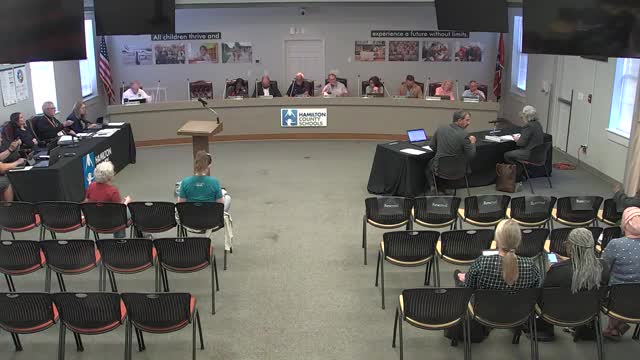Parents Demand Delay on Controversial Mental Health Agreement
July 18, 2024 | Hamilton County, School Districts, Tennessee

This article was created by AI summarizing key points discussed. AI makes mistakes, so for full details and context, please refer to the video of the full meeting. Please report any errors so we can fix them. Report an error »

During a recent Hamilton County Board of Education meeting, community members voiced significant concerns regarding a proposed memorandum of understanding (MOU) with Centerstone Mental Health. The discussions centered on the implications of the MOU for student mental health services and the perceived lack of transparency and parental involvement in the decision-making process.
Rebecca Day, a parent representative, urged the board to delay the MOU presentation, arguing that it would allow for greater scrutiny and input from parents. She highlighted that the current financial arrangement with Centerstone effectively results in taxpayers paying twice for the same services, as Centerstone bills Medicaid while local taxpayers fund school facilities and staff. Day emphasized the need for a thorough review of Centerstone's impact over the past decade, questioning whether the partnership has genuinely benefited student outcomes.
Harriet Reid echoed these sentiments, suggesting that the new board should be the one to decide on the MOU, especially given its long-term implications. She criticized the timing of the meeting during summer months when parental engagement is typically lower and expressed concern over the board's focus on mental health services rather than improving academic performance, particularly in light of recent literacy challenges among students.
Jessica Perkins raised additional issues, including Centerstone's poor return on investment and the ethical implications of their quota-based system, which she argued could compromise the quality of care provided to students. Perkins also expressed her belief that parents should have the primary responsibility for their children's mental health care decisions, rather than the school system.
Board members responded to the concerns, clarifying that parental consent is required for students to access Centerstone's services and that the partnership aims to provide essential support for families who may not have access to such resources otherwise. They acknowledged the importance of community feedback but defended the ongoing relationship with Centerstone as beneficial for underserved students.
The meeting highlighted a growing tension between the board's commitment to mental health services and the community's desire for a stronger focus on academic outcomes and parental involvement in educational decisions. As discussions continue, the board faces the challenge of balancing these competing priorities while ensuring transparency and accountability in its partnerships.
Rebecca Day, a parent representative, urged the board to delay the MOU presentation, arguing that it would allow for greater scrutiny and input from parents. She highlighted that the current financial arrangement with Centerstone effectively results in taxpayers paying twice for the same services, as Centerstone bills Medicaid while local taxpayers fund school facilities and staff. Day emphasized the need for a thorough review of Centerstone's impact over the past decade, questioning whether the partnership has genuinely benefited student outcomes.
Harriet Reid echoed these sentiments, suggesting that the new board should be the one to decide on the MOU, especially given its long-term implications. She criticized the timing of the meeting during summer months when parental engagement is typically lower and expressed concern over the board's focus on mental health services rather than improving academic performance, particularly in light of recent literacy challenges among students.
Jessica Perkins raised additional issues, including Centerstone's poor return on investment and the ethical implications of their quota-based system, which she argued could compromise the quality of care provided to students. Perkins also expressed her belief that parents should have the primary responsibility for their children's mental health care decisions, rather than the school system.
Board members responded to the concerns, clarifying that parental consent is required for students to access Centerstone's services and that the partnership aims to provide essential support for families who may not have access to such resources otherwise. They acknowledged the importance of community feedback but defended the ongoing relationship with Centerstone as beneficial for underserved students.
The meeting highlighted a growing tension between the board's commitment to mental health services and the community's desire for a stronger focus on academic outcomes and parental involvement in educational decisions. As discussions continue, the board faces the challenge of balancing these competing priorities while ensuring transparency and accountability in its partnerships.
View full meeting
This article is based on a recent meeting—watch the full video and explore the complete transcript for deeper insights into the discussion.
View full meeting
